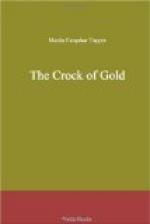By a Juryman. He would swear to the words.
But Don would not hear of being quiet. After that, knowing all must be right if Mr. Jennings was about, he (deponent) turned in again, went to sleep, and thought no more of it till he heard of Mrs. Quarles’s death in the morning. If he may be so bold as to speak his mind, he thinks the house-keeper, being fat, died o’ the ’plexy in a nateral way, and that the dog barking so, just as she was a-going off, is proof positive of it. He’d often heard of dogs doing so; they saw the sperit gliding away, and barked at it; his (deponent’s) own grandmother—
At this juncture—for the court was getting fidgetty—the coroner cut short the opinions of Jonathan Floyd: and when Mr. Crown, summing up, presented in one focus all this evidence to the misty minds of the assembled jurymen, it puzzled them entirely; they could not see their way, fairly addled, did not know at all what to make of it. On the threshold, there was no proof it was a murder—the Union doctor was loud and staunch on this; and next, there seemed to be no motive for the deed, and no one to suspect of it: so they left the matter open, found her simply “Dead,” and troubled their heads no more about the business.
Good Mr. Evans, the vicar, preached her funeral sermon, only as last Sunday, amplifying the idea that she “was cut off in the midst of her days:” and thereby encouraging many of the simpler folks, who knew that Mrs. Quarles had long passed seventy, in the luminous notion that house-keepers in great establishments are privileged, among other undoubted perquisites, to live to a hundred and forty, unless cut off by apoplexy or murder.
Mr. Simon Jennings, as nephew and next of kin, followed the body to its last home in the capacity of chief mourner; to do him justice, he was a real mourner, bewailed her loudly, and had never been the same man since. Moreover, although aforetime not much given to indiscriminate charity, he had now gained no small credit by distributing his aunt’s wardrobe among the poorer families at Hurstley. It was really very kind of him, and the more so, as being altogether unexpected: he got great praise for this, did Mr. Jennings; specially, too, because he had gained nothing whatever from his aunt’s death, though her heir and probable legatee, and clearly was a disappointed man.
CHAPTER VI.
The bailiff; and A bitter trial.
Jennings—Mr. Simon Jennings—for he prided himself much both on the Mr. and the Simon, was an upright man, a very upright man indeed, literally so as well as metaphorically. He was not tall certainly, but what there was of him stood bolt upright. Many fancied that his neck was possessed of some natural infirmity, or rather firmity, of unbendableness, some little-to-be-envied property of being a perpetual stiff-neck; and they were the more countenanced in




